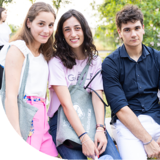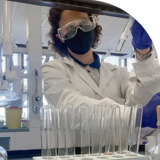The first year of the programme is aimed at conveying specialist biotechnological knowledge in the following learning areas.
Cellular and Molecular Biotechnology
- Deepen the specialist knowledge of advanced cellular biotechnologies, ranging from the characterisation and potential application of somatic stem cells in human tissues, the molecular mechanisms underlying differentiation and morphogenesis, to the study of the characteristics and properties of microbial communities in the human body, with particular attention to the intestinal microbiota.
- Deepen specialist knowledge of topics relating to modern molecular biotechnology in the field of high-process analytical biochemistry, genetic engineering and molecular biology methods for the production of recombinant proteins and gene therapy applications.
- Provide students with practical laboratory skills in the different areas of the programme, through the implementation of a set of exercises focused on learning how to use the different instruments and the associated experimental protocols.
Morphological and Functional Sciences
- Deepen the knowledge of the morphofunctional aspects of the various organs and systems of the human organism, integrating their structural, macroscopic, microscopic and ultrastructural aspects with their
- functional ones.
- The ability to deepen the specialist knowledge of topics related to different disciplines in the biological and medical field, for the adequate understanding of the molecular mechanisms involved in the onset and development of human diseases.
The second year of the programme takes the form of one common training part in the learning area of:
Regulatory, Economic and Patent aspects
- Deepen specialist knowledge of the methodological, procedural, legislative and management aspects underlying the industrial development of modern biotechnology and its application in the clinical field.
- Deepen specialist knowledge of integrated methodological aspects for the analysis and validation of experimental results produced by the application of innovative biotechnologies, supported by knowledge
- of information algorithms and adequate consideration of bioethical issues.
The second part of the second year is divided into two profiles, one in the therapeutic field and the other in the diagnostic field, with activities carried out both in the research laboratories of Università Cattolica del Sacro Cuore and at A. Gemelli University Polyclinic Foundation - IRCCS, as well as with internships at companies in the sector. The training activities will be divided, respectively, into the following learning areas:
Innovative Therapies, Regenerative Medicine and Nanomedicine (Therapeutic profile)
- Deepen specialist and multidisciplinary knowledge of the various biotechnological and nanotechnological approaches to the development of modern innovative therapies.
Advanced and high-processivity diagnostics (Diagnostic curriculum)
- Deepen the specialist knowledge necessary for the understanding, development and implementation of new technologies for advanced diagnostics in the fields of genomics, pathology, biochemistry, microbiology and forensics.
Training credits
The training programme takes place over two years, divided into semesters, and is divided into two profile: one diagnostic and the other therapeutic. Over the two years of the programme the student obtains a total of 120 ECTS. The university training credit (ECTS) corresponds to 25 hours of total effort per student. The distribution of the total hourly commitment for each ECTS between teaching and individual study is determined as follows:
- 1 ECTS lecture: 8 hours of lectures + 17 hours of individual study
- 1 ECTS laboratory: 8 hours of teaching + 17 hours of individual study
- 1 ECTS curricular training: 25 hours of training activities (at the organisation/ industry where the traineeship/internship is carried out)
- 1 ECTS final examination: 25 hours of individual study
The student acquires the ECTS foreseen for each training activity following the passing of an examination or other forms of verification of learning.
Attendance
All training activities, both classroom lessons and laboratory experiments, require compulsory attendance. In order to sit the exams, at least 65% of the face-to-face classroom lessons and at least 80% of the laboratory activities must be attended. It is left to each professor/lecture responsible for the course to decide how to check attendance.





